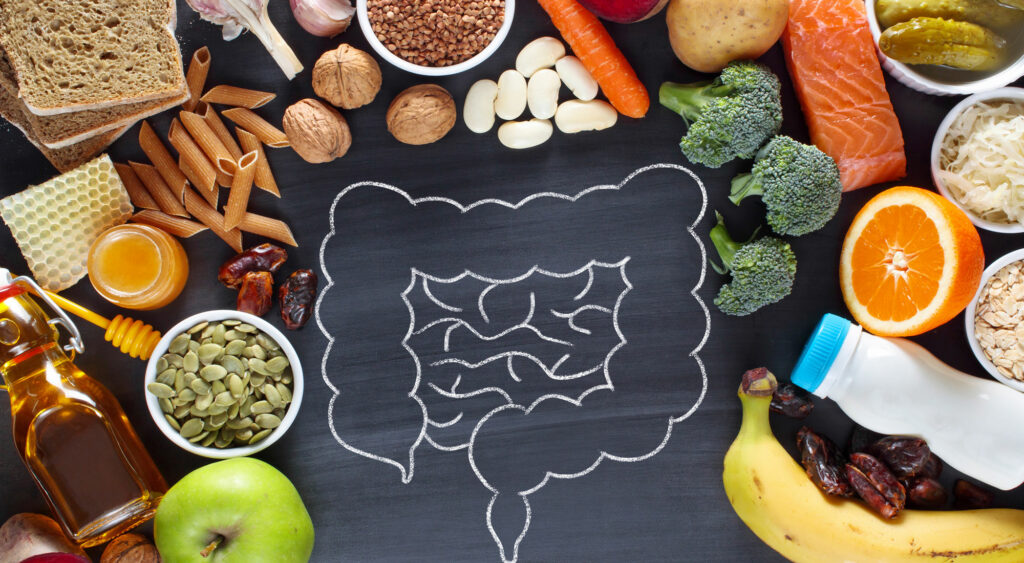By Mandy Parsons
The term “gut health” is everywhere, quickly becoming a buzzword among wellness circles and beyond. So, what’s all the hype about? The concept seems simple enough: Proper nutrition fuels healthy digestion. But is there more to it?
Cleveland Clinic defines gut health as “the health of your entire digestive system and the health of the microorganisms living in your digestive tract.” To clarify, the digestive system includes your digestive tract, also known as the gastrointestinal (GI) tract, and biliary system.
The digestive tract is the largest part of your digestive system and home to trillions of microbes. This community of bacteria, fungi, yeast, and viruses is often referred to as the “gut microbiome.” And, according to experts, our gut microbiome not only affects the breakdown and absorption of nutrients from food, but also our mental health.
What is the link between gut health and mental health? Could taking care of your gut mean a happy and healthier you? Let’s take a closer look at the gut-brain connection.
The Gut-Brain Axis
We’ve all experienced “butterflies” in our stomach or received bad news that felt like a punch to the gut. That’s because our brain and gut communicate with each other.
In fact, this connection is so powerful that it has been dubbed the “gut-brain axis.” As Medical News Today explains, the gut-brain axis is the bidirectional communication system between the digestive tract and the brain.
This system encompasses a complex network of nerves and biochemicals. For example, neural pathways facilitate communication between the enteric nervous system (dense neurons lining the GI tract) and the central nervous system (brain and spinal cord).
Similarly, chemical neurotransmitters produced by the gut, like serotonin, send signals to the brain about things like your mood, sleep, appetite, or concentration. Likewise, organisms in the gut microbiome produce various metabolites and bioactive compounds that can travel to the brain and affect neurological function.
All things considered, a healthy gut has implications beyond food digestion. It can influence both your mental and emotional health.
Gut Health and Mood
In recent years, research has indicated a strong correlation between gut health and mood. What we eat alters the gut microbiome, often to the benefit or detriment of our mental wellness.
In a Beyond Theory podcast, Meadows Senior Fellow Kristin Kirkpatrick shared that studies have been conducted for over a decade now. “[They] have looked at the connection between certain dietary indicators … and how they related to lessening symptoms of depression, maybe even the prevention of low-level depression,” Kirkpatrick says.
One such study published by BMC Medicine showed that after a 12-week intervention of patients suffering from major depression, those who received dietary counseling, in addition to their current treatment, experienced a 32.3% remission rate.
And it’s not just about upping your intake of foods rich in folate, vitamin D, or omega-3 fatty acids. Medical professionals advise limiting fast foods, processed foods, and those with high sugar content, as junk food increases inflammation throughout the body. Systemic inflammation can be the culprit of anxiety and depressive symptoms.
What you eat impacts how you feel, therefore it would be smart to keep your gut microbiome balanced for the sake of your body and mind. But how?
Keeping Your Gut Healthy
Perhaps you are concerned about your gut health and mental health, or you believe there might be a link between your gut health and mood swings. Consider the following tips to keep your gut healthy and boost your mood:
- Consume whole foods and grains as well as lean meats
- Limit or skip prepackaged and processed foods
- Cut back on foods that are high in sugar
- Incorporate a rainbow of fruits and vegetables into your diet
- Consider adding probiotic-rich foods to diversify the microbes in your gut
- Commit to getting enough exercise and sleep
By adopting some simple changes, you can initiate a positive cycle of feeling better. Eating healthy meals and learning how to care for your body is crucial to long-term wellness.
But as Harvard Health warns, be careful not to use food as the only treatment for gut health and mood disorders. Nutrition is not a cure-all, especially for serious forms of depression and suicidal thoughts. It should be combined with other methods of treatment for the most effective results.
We Are Here for You
Here at Onward, we care about your recovery and ongoing health journey. As an alum of our Meadows Behavioral Healthcare programs, you are our priority. Through our alumni support groups, resources, and events, you can experience the same kind of nurturing care and support that you received during treatment. You do not have to go it alone, nor should you! Reach out to our caring team today to learn how you can take advantage of all we have to offer at Onward.

